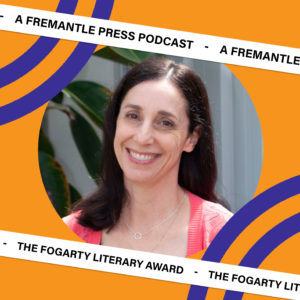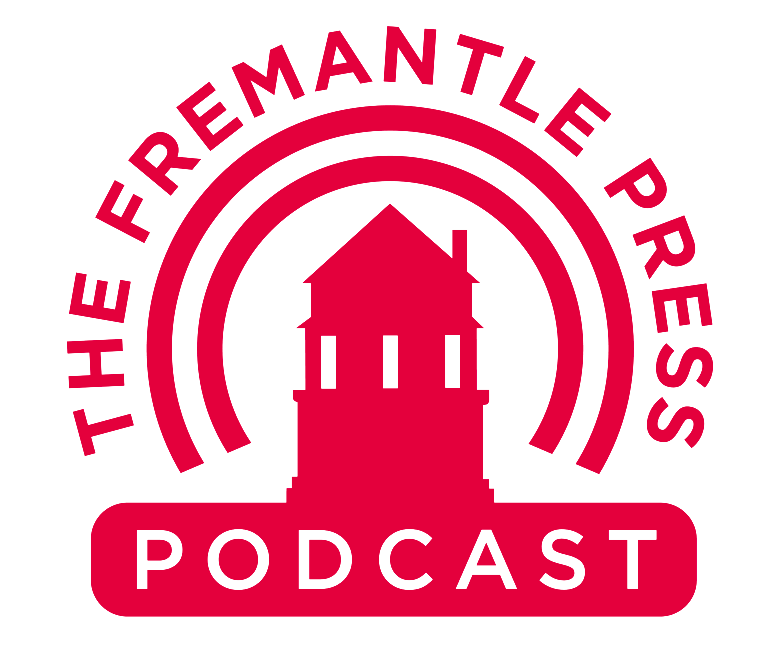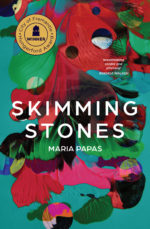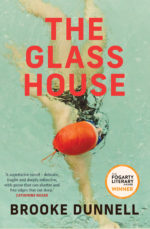Brooke Dunnell presents: award-winning novelist Maria Papas challenges the narrative arc in her novel about the effects of childhood illness

Speaking to Brooke Dunnell on the Fremantle Press podcast, novelist Maria Papas said when she was younger some people told her ‘Writing’s not really a career for a girl from Bunbury … you have to pick something safer’. But, as she points out, her enjoyment of writing has held her in good stead so far.
Maria won the 2020 City of Fremantle Hungerford Award for her novel Skimming Stones which follows paediatric nurse Grace as she is confronted by childhood memories of her sister’s illness.
Papas’ book Skimming Stones doesn’t follow a typical narrative arc. In this interview, she explains why not. She said, ‘I kept trying to tell the story as a narrative … and I kept on getting stuck … it didn’t feel natural.’ She said she started to research how somebody in trauma or illness did typically tell a story and found that, for the most part, their stories didn’t follow a linear path. Maria said, ‘The person might go back in time to remap what happened or what alternative options could have happened, if only… or they might go to the future to map a more palatable future for the people involved. It’s very difficult to stay in the present moment and very difficult to have a timeline that doesn’t have all those other events that haven’t actually occurred. There is a word for this it’s called the dis-narration.’
Topics discussed:
The origins and inspiration behind Skimming Stones
Writing illness and trauma
Dis-narration
Point of view and representation
Submitting your manuscript for awards
Skimming Stones is available in all good bookstores and online.
About the host
Brooke Dunnell is the author of the short story collection Female(s and) Dogs, which was a finalist for the 2020 Carmel Bird Digital Literary Award. Her short stories have been recognised in competitions including the Bridport Short Story Prize 2019 and the Neilma Sidney Short Story Prize 2017, and have appeared in The Best Australian Stories, New Australian Stories 2, The Big Issue fiction edition and other anthologies. Brooke has worked as a creative writing mentor, workshop facilitator and judge in various creative writing competitions. She has a PhD in Creative Writing from the University of Western Australia and lives in Perth. Her novel, The Glasshouse, won the 2021 Fogarty Literary Award and will be published in November 2022.
Connect with Brooke at brookedunnell.com or on Twitter @TheSpineLabel or Instagram @Brooky.Brooks.
About the guest
Maria Papas is a West Australian writer whose fiction, creative non-fiction and academic essays have appeared in various journals including TEXT, Griffith Review, Axon and The Letters Page. She holds a PhD from the University of Western Australia where she researched the ways people share narratives of illness and trauma. In 2020, the creative component of her research won the City of Fremantle Hungerford Award, and has since been published as her debut novel, Skimming Stones. Maria works as an English teacher and sessional academic, and when she is not writing or working, you can find her near the coast or with family.
Connect with Maria at mariapapas.com or on Twitter @mariapapas5 or Instagram @MiaMaria_Books.
Books, authors and other stuff mentioned
Lake Clifton
The Year of Magical Thinking by Joan Didion
The Lake’s Apprentice by Annamaria Weldon
The City of Fremantle Hungerford Award
Original music
‘Letter to a Daughter of St George’, from the Meat Lunch E.P.: Songs from Floaters. Written by Alan Fyfe. Performed by Trevor Bentley (guitar and vocals – @trevormb) and Chris Parkinson (harmonica). Produced by Blake Carnaby of Nuglife studios with impresario work by Benjamin P. Newton.
Sound engineering
Aidan D’Adhemar, Fremantle PA Hire
Produced by
Claire Miller, Fremantle Press Marketing and Communications
This podcast was produced in Walyalap in Wadjuk Boodja, on the lands of the Noongar people.





